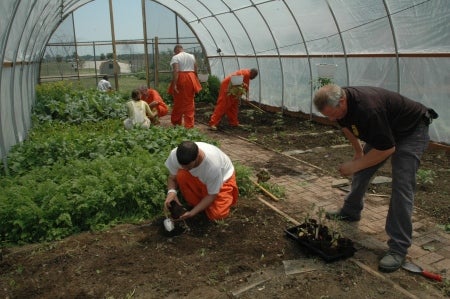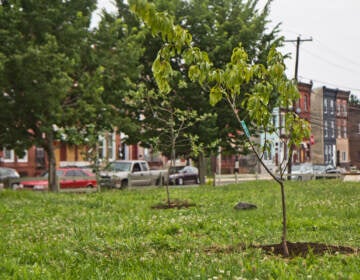Greenhouse in the Big House

Right about now, outdoor vegetable gardens are looking pretty barren. Forget the groundhog’s predictions, it’s in the greenhouses, where one can get real hope that spring is coming.
Sharat Somashekara is a Horticultural Instructor in this Philadelphia House of Corrections greenhouse, “right now we’re growing lettuce, swiss chard with these beautiful multi-colored stems, and this Asian vegetable called tatsoi.” His student, Rhonda Gibson calls out, “you gonna water these over here Sharat cause they drying out.” She’s also a prisoner. She’s in for aggravated assault.
This greenhouse is part of the Philadelphia Prison System. They grow over 4,000 pounds of food a year. And by doing this they are contributing to society outside the walls, as Sharat explains, “the inmates that we deal with understand food we grow goes to soup kitchens and food pantries and they understand the plants and trees go to gardening projects all over city.”
Sharat works for the Pennsylvania Horticultural Society. A lot of the seedlings in the Prison greenhouse will eventually be replanted in community gardens and urban farms. Rhonda Gibson says she’s grateful to have a way to be constructive, “feels good to know we are able to grow something that people can actually eat and that its safe and organic. Makes me feel that I am part of growth, that I’m part of life.”
The program is open to both men and women, but according to Tom O’Neal, the Correctional Officer who helps run the greenhouse for the prison, some men are hesitant to sign up. “Initially they are uncertain, they think we are doing flowers and they are like, ‘I’m not doing flowers.’ they get here and they realize, it’s actually a farm, so much better being out here in the open, than being locked up.”
Behind the greenhouse, there’s a piece of land for growing food in the summer months. There are kiwi vines and paw paw trees. It’s a stark contrast to life inside. Horticultural Instructor, Sharat says, “we’ve worked with 500 inmates over last 5 years. They deal with all sort of problems, people who have had to prostitute themselves, a lot of people we deal with have substance abuse problems, and generations of ingrain poverty to deal with and overcome, perhaps.”
One thing it takes to grow food is time, and that is something the prisoners do have. According to officer Tom O’Neal gardening can be both educational and therapeutic. “For someone who is truly about bettering themselves, and being introspective about why they are here and getting serious on life, this is great. If you still want to run game in jail I can weed them out. If they are willing to prove themselves, I am happy to have them out here.”
Rhonda Gibson says she has been using the time to think about what she’s done, plus learn something new. Today she’s transplanting seedlings. She doesn’t even mind getting dirty, in fact it evokes pleasant memories, “I used to have mud pies when I was kid, really doesn’t bother me. Nothing I’m not used to, we came from the dirt, so…”
And it seems thinking of the past, is also getting her, and the seedlings ready for a brighter future as she proves from a short rendition of the song The Sun Will Come Out Tomorrow.
Article originally posted on February 19th 2011 by Therese Madden on whyy.org
WHYY is your source for fact-based, in-depth journalism and information. As a nonprofit organization, we rely on financial support from readers like you. Please give today.




